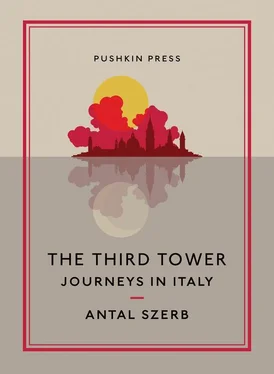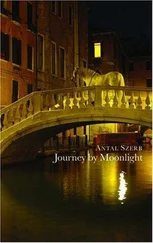To add to the fun, the entire festive, travel-subsidized population of Italy had chosen the occasion to park itself in the Piazza Erbe, singing, shouting, guffawing and having a thoroughly good time, directly under my window, until five in the morning. I didn’t close my eyes all night.
This night of torture greatly assisted my snobbish bourgeois impulses in their urge to torment me. “This could only have happened to you, you little school-teacher — taking a room like that!” they smirked. “A proper chap would have run a mile. Your father would never have set foot in such a place, and neither would any of your countless relatives. With a floor-level window!”
I was indeed ashamed of myself. Intensely ashamed. All night long.
The following day I got straight on the train and went to Lake Garda. The boat was so crammed that the regular passengers were pushing and shoving each other with their suitcases on the gangway. But I had purchased a first-class ticket and made my way down to the main seating area. I had no view, but I was able to loll around in comfort and was almost alone. I disembarked at Gardone and installed myself in a really good hotel (I mustn’t boast — it was also quite cheap: Gardone is the hottest place in northern Italy and there are no high-season rates at that time of year). I took pleasure in the hot water tap, which actually produced wonderfully hot water; in the lunch, where, at long last, the two staple cheeses of Italy, Gorgonzola and Bel Paese, the blonde and brunette varieties, made their appearance; and in the young middle-class clientele — the sort of people you might see in the Forum cinema back in Pest. I grandly exchanged a 500-lira note, and the waiter counted out the great centuries of Italian history onto the table: trecento… quattrocento… cinquecento. Then I devoted myself to washing off the last grimy, painful consciousness of proletarianization and placelessness in the cool, dark waters of Lake Garda.
So there you have it: I’m no better than anyone else.
And yet I loathe nothing in the world more than the sense of bourgeois superiority. The bourgeoisie stands in the same relation to the genuine aristocracy as a mosquito priding itself on its class superiority over a flea. I loathe the bourgeois notion of “being of a good family”—which simply means that Pater is now well-to-do because he bought a licensed brothel in Mohács. I loathe bourgeois “civilization”, which amounts to little more than “when I die I want hot and cold running water in my tomb”. I hate the bourgeois notion of “culture” that underpins the novels of Zsolt Harsányi and Stefan Zweig. I loathe all distinctions based on money, and pseudo-money, and the appearance of money. Money itself I love, and I wouldn’t mind having a lot more of it — but not because that would make me a gentleman. I am quite certain that I never will be a gentleman: for that one would need not only a great deal more money and free time than I have, but also a lot more breeding. I might of course pass as a gentleman in the Budapest sense of the word, meaning that I wear a collar and tie, though not always, and that at the very first opportunity I too turn my nose up, just like the rest of my fellow countrymen. And of course I too believe that my social rank is a matter of finding the right hotel room, eating in the right restaurant and having a suitable seat on the train. But I also know perfectly well that it depends on nothing of a material nature, and that my essential commonness, my innate lower-classness, mean no more than that, in the typical Budapest way, I feel the force of the rules but not the obligations they imply. Such is the power over me of my “good”, and therefore thoroughly bad, upbringing.

Fie on you! You should be ashamed of yourself!
Later, I realized that my analysis had been incomplete, and that my malaise had other causes than simply my entrenched snobbery.
PEOPLE ARE in general most deeply surprised by two things: one is when something turns out to be completely different from what they have been led to expect, the other when they find it exactly as it had been described. The latter occurs to me much more often.
And so it was with the heat. Everyone had said that the summer in Italy would be very, very hot. At first I thought of it as simply my usual bad luck. Only with time did I begin to realize that it was the natural order of things, something the natives take for granted. The heat starts at four in the morning and lasts until eight at night. There are few hours in between when the temperatures are bearable, and the pattern is not an agreeable one.
I feel hot not only when I go walking. Sometimes I can be sitting and suddenly the heat will envelop me — calmly, serenely, overpoweringly. It feels as if I am stewing in my own juices. Not pleasant.
HERE, in the Vittoriale Palace beside Lake Garda, resides one of the national treasures, D’Annunzio. I looked the place over. Poor old D’Annunzio! Can the tastes of his period really be so passé? Or are the young of Italy right in their savagely ironic view of him as a raw, impotent peasant, and — in their fastidiousness and “good taste”—to see his art as the snobbish affectation of a parvenu, as the English did with Oscar Wilde’s decadence?
I TAKE A STROLL between the lakeside mountains, and am gazing around, almost half-consciously, when, with an almost painful sense of wonder, it suddenly strikes me: this is Italy! Before me stands a house; in front of it, a cypress tree. Any drawing, of an Egyptian sphinx or pyramid, to give the most obvious example, says more than any photograph can. The pencil simplifies a landscape, condensing it down to its essence, to a motif. The scene before me now represents Italian stylization in its ultimate simplicity: a rectangular, flat-roofed house beside a cypress tree somewhat taller than itself. House and cypress tree: in our Northern winters, beyond the ice wall of the Alps, it will be enough to conjure up this image to myself to feel the whole of Italy coming alive inside me once again.
“The cypress standing guard in front of the house”: a literary cliché. But, like most clichés, profoundly true. The cypress really does seem to stand guard: solemn to the point of pomposity and at the same time inspiring in its nobility and fidelity — like the faithful St Bernard dog.
AMONG THE TRULY LONELY I class those who are alone very seldom, and then perhaps only in moments set aside for reading or writing. My profession, schoolteaching, by its very nature forces even the most highly strung person into contact with others; and then, in the evening, a certain anxiety verging on panic drives him back into company.
I have been alone here for several days now. Apart from seeking information and making arrangements, I have exchanged not a word with anyone. It is the first time in my life that I have been on my own for so long.
It quite astonishes me how little I miss human company. I would never have thought how well I would get by without conversation and companionship. For advice I go to Baedeker. He serves as my real friend. He thinks of everything, tells me where I should go. Anything I really want to say is committed to a notepad.
I can feel the good this solitude is doing me. My thoughts arrange themselves in longer sequences. My feelings are more intense, and I see their outlines more clearly. Chaotic thoughts are reduced to order, and almost everything welling up inside me spills out and ripens toward form and expression.
Читать дальше













